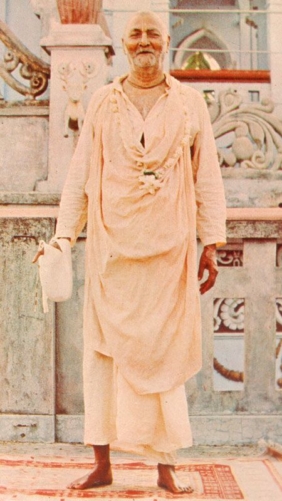MADHU BINDAVAH
PRANATI-PANCHAKAM
Five Verses in Obeisance
to Om Visnupad
Srimad Bhakti Raksak Sridhar Dev-Goswami Maharaj
on the 62nd anniversary of his holy appearance day.
By Srila Bhakti Sundar Govinda Dev-Goswami Maharaj
A Sanskrit poem originally published in Śrī Gauḍīya Darśan,
Volume 2, Issue 4, Tuesday, 13 November 1956.

নবনলিনগঞ্জিতং কুসুমদলমণ্ডিতং
পাদযুগমভয়বরদানম্ ।
কনকঘননিন্দিতং বপুরমরবন্দিতং
নটনগতি-গৌরবনিদানম্ ॥১॥
nava-nalina-gañjitaṁ kusuma-dala-maṇḍitaṁ
pāda-yugam abhaya-vara-dānam
kanaka-ghana-ninditaṁ vapur amara-vanditaṁ
naṭana-gati-gaurava-nidānam [1]
[His] yugam–pair pāda–of feet [have] gañjitam–outshined nava–fresh nalina–lotus flowers, [are] maṇḍitam–adorned [with] kusuma–flower dala–petals, [and are] dānam–an offering vara–of the benediction abhaya–of fearlessness. [His] vapuḥ–figure [has] ninditam–rebuked ghana–refined kanaka–gold, [is] vanditam–worshipped amara–by the immortals, [and has] nidānam–conquered gaurava–the pride naṭana–of dance gati–movements. [1]
His feet outshine fresh lotus flowers, are adorned with flower petals, and offer the benediction of fearlessness. His figure rebukes refined gold, is worshipped by the immortals, and conquers the pride of dance movements.
ভজে শ্রীধরস্বামিনমনিশম্ ।
শরদবিধুনিন্দিমুখ- পদ্মমতিশোভনং
গোপীতিলকচর্চ্চিতসুভালম্ ॥২॥
bhaje śrīdhara-svāminam aniśam
śarada-vidhu-nindi-mukha- padmam ati-śobhanaṁ
gopī-tilaka-charchchita-subhālam [2]
bhaje–I serve śrīdhara–Śrīdhar svāminam–Swāmī aniśam–forever. [His] ati–most śobhanam–beautiful padmam–lotus mukha–face nindi–rebukes śarada–the autumn vidhu–moon, [and his] subhālam–broad forehead [is] charchchita–adorned gopī-tilaka–with gopī-chandan tilak. [2]
I serve Śrī Śrīdhar Swāmī forever. His most beautiful lotus face rebukes the autumn moon, and his broad forehead is anointed with gopī-chandan tilaka.
গমনজিতবারণং শমনভয়তারণং
প্রকৃতিরুচিনিন্দিকৃতবেশম্ ।
ফুল্লকরপল্লবং ভক্তজনবল্লভং
তুঙ্গপৃথুলং হৃদয়দেশম্ ॥৩॥
gamana-jita-vāraṇaṁ śamana-bhaya-tāraṇaṁ
prakṛti-ruchi-nindi-kṛta-veśam
phulla-kara-pallavaṁ bhakta-jana-vallabhaṁ
tuṅga-pṛthulaṁ hṛdaya-deśam [3]
[His] gamana–stride [has] jita–surpassed [that] vāraṇam–of an elephant, [he is] tāraṇam–deliverance bhaya–from fear śamana–of Death, and [his] veśam–appearance [has] nindi-kṛta–rebuked ruchi–the beauty prakṛti–of the material energy. [His] kara–hands [resemble] phulla–full pallavam–blossoms, [he is] vallabham–the beloved bhakta-jana–of the devotees, [and] deśam–the land hṛdaya–of [his] heart [is] tuṅga–high [and] pṛthulam–broad. [3]
His stride surpasses that of an elephant, he delivers all from fear of Death, and his appearance rebukes the beauty of the material energy. His hands resemble full blossoms, he is the beloved of the devotees, and the land of his heart is high and broad.
গৌরপুর-সৌরভং কৃষ্ণপুর-গৌরবং
বিবুধকুলপদ্মনলিনীশং ।
ভণ্ডকুলদণ্ডনং ভণ্ডমতখণ্ডনং
ভক্তকুলনন্দনযতীশম্ ॥৪॥
gaura-pura-saurabhaṁ kṛṣṇa-pura-gauravaṁ
vibudha-kula-padma-nalinīśaṁ
bhaṇḍa-kula-daṇḍanaṁ bhaṇḍa-mata-khaṇḍanaṁ
bhakta-kula-nandana-yatīśam [4]
[He embodies] saurabham–the fragrance gaura–of Gaura’s pura–abode [and] gauravam–the dignity kṛṣṇa–of Kṛṣṇa’s pura–abode. [He is] īśam–the master nalinī–of the assembly padma–of the lotus flowers vibudha-kula–of the wise. [He is] daṇḍanam–the punisher bhaṇḍa-kula–of the hypocrites, khaṇḍanam–the destroyer bhaṇḍa-mata–of hypocrisy, [and] īśam–the master yati–renunciant [who is] nandana–the delight bhakta-kula–of the devotees. [4]
He embodies the fragrance of Gaura’s abode and the dignity of Kṛṣṇa’s abode. He is the master of lotus-like wise persons, the punisher of the hypocrites, the destroyer of hypocrisy, and the master renunciant who delights the devotees.
ত্রিভুবননিবাসিনে কৃষ্ণমুপদেশিনং
অসুরকুল-দাম্ভিক-কৃতান্তম্ ।
নৌমি বুধনায়কং পরমগতিদায়কং
মম শরণমরণগণচিন্ত্যম্ ॥৫॥
tribhuvana-nivāsine kṛṣṇam upadeśinaṁ
asura-kula-dāmbhika-kṛtāntam
naumi budha-nāyakaṁ parama-gati-dāyakaṁ
mama śaraṇam araṇa-gaṇa-chintyam [5]
[He is] upadeśinam–the teacher nivāsine–of the residents tribhuvana–of the three worlds kṛṣṇam–about Kṛṣṇa [and] kṛta-antam–the subduer dāmbhika–of the deceitful [and] asura-kula–the demonic. naumi–I offer my obeisance nāyakam–to this leader budha–of the wise, dāyakam–the giver parama–of the highest gati–attainment, mama–my śaraṇam–shelter, chintyam–the object of meditation araṇa-gaṇa–for the suffering. [5]
He teaches the residents of the three worlds about Kṛṣṇa and subdues the deceitful and demonic. I offer my obeisance to this leader of the wise, the giver of the highest attainment, my shelter, the object of meditation for all who are suffering.








